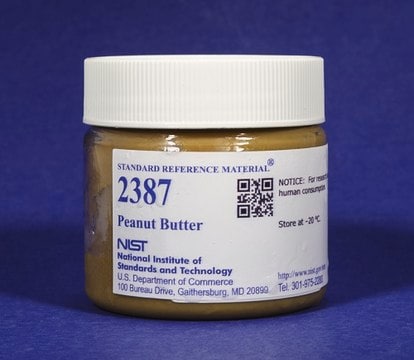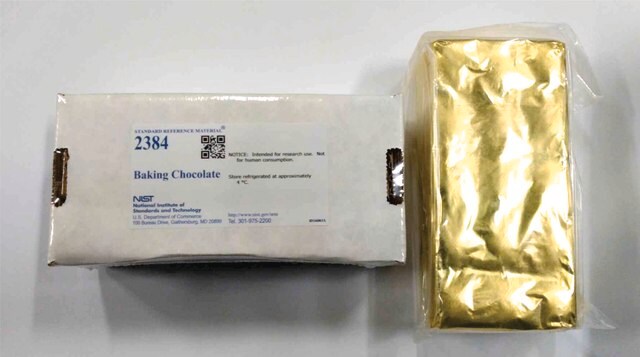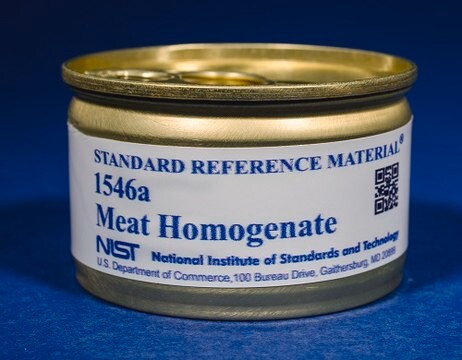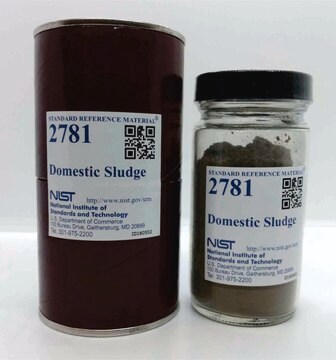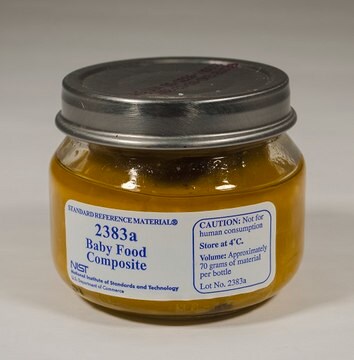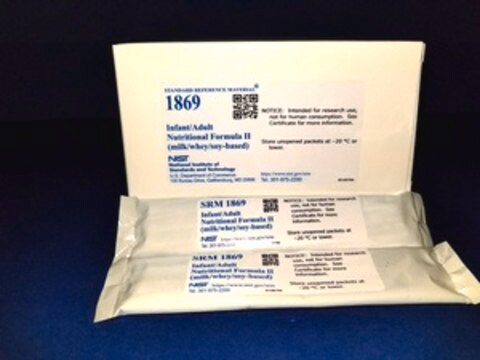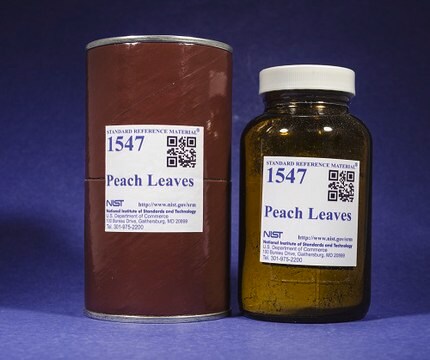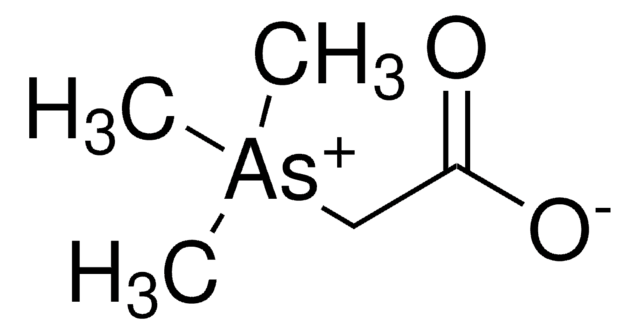NIST3233
Fortified breakfast cereal
NIST® SRM® 3233
Zaloguj sięWyświetlanie cen organizacyjnych i kontraktowych
About This Item
Kod UNSPSC:
41116107
NACRES:
NA.24
Polecane produkty
klasa czystości
certified reference material
Poziom jakości
opakowanie
pkg of 60 g ea
producent / nazwa handlowa
NIST®
Zastosowanie
food and beverages
Format
matrix material
Opis ogólny
This Standard Reference Material (SRM) is intended primarily for validation of methods for determining proximates, sugars, dietary fiber, vitamins, elements, and amino acids in fortified breakfast cereals and similar materials. This SRM can also be used for quality assurance when assigning values to in-house reference materials. The SRM is a wheat-based fortified breakfast cereal prepared by a commercial manufacturer. A unit of SRM 3233 consists of one bottle containing approximately 60 g of material and sealed inside an aluminized pouch. For more information, please refer to the SDS and COA.
SRM 3233_cert
SRM 3233_SDS
SRM 3233_cert
SRM 3233_SDS
Zastosowanie
- Vitamin D fortification in breakfast cereals: A systematic review and meta-analysis focused on the effectiveness of using fortified breakfast cereals as vehicles for improving vitamin D status, providing essential insights for nutritional science and public health strategies (Cashman and O′Neill, 2024).
- Protein fortification for the aging population: Research discusses the design implications for protein-fortified foods, including cereals, aimed at increasing protein intake among the elderly, highlighting its significance in maintaining muscle mass and overall health (Norton et al., 2022).
- Strategies for achieving recommended vitamin D intakes: An article outlines various fortification strategies, including the use of fortified cereals, to meet the recommended dietary intakes of vitamin D, essential for bone health and disease prevention (López-Sobaler et al., 2022).
- Critical appraisal of ultraprocessed fortification alternatives: A critical review evaluates ultraprocessed products, including fortified cereals, as alternatives for food fortification in Latin America, discussing their impact on nutrition and public health (Kroker-Lobos et al., 2022).
- Impact of fortified foods on iron status: A study investigates the association between the consumption of iron-fortified foods, such as cereals, and serum ferritin levels among women of childbearing age, emphasizing the importance of fortified foods in preventing iron deficiency (Nyakundi et al., 2022).
Inne uwagi
Certified for the analytes listed below.
Barium (Ba), Cadmium (Cd), Calcium (Ca), Copper (Cu), Iron (Fe), Magnesium (Mg), Manganese (Mn), Phosphorus (P), Potassium (K), Sodium (Na), Strontium (Sr), Zinc (Zn)
Vitamins : Thiamine (Vitamin B1), Niacinamide (Vitamin B3), Total Vitamin B3 as Niacinamide, Pantothenic Acid (Vitamin B5), Folic Acid, Total α-Tocopherol (Vitamin E)
Reference/Informational value is provided for the following analytes.
Cobalt (Co), Molybdenum (Mo), Vanadium (V), Niacin
Proximates, sugar, calories : Ash, Protein, Fat, Carbohydrates, Total Sugars, Fructose, Glucose, Maltose, Sucrose, Energy, Calories, IDF + HMW SDF, IDF, LMW SDF, HMW SDF, TDF, Alanine, Arginine, Aspartic Acid, Cystine, Glutamic Acid, Glycine, Histidine, Isoleucine, Leucine, Lysine, Methionine, Phenylalanine, Serine, Threonine, Tryptophan, Tyrosine, Valine, Aluminum (Al), Chlorine (Cl), Iodine (I), Arsenic (As)
See certificate for values and more details at nist.gov/SRM.
Barium (Ba), Cadmium (Cd), Calcium (Ca), Copper (Cu), Iron (Fe), Magnesium (Mg), Manganese (Mn), Phosphorus (P), Potassium (K), Sodium (Na), Strontium (Sr), Zinc (Zn)
Vitamins : Thiamine (Vitamin B1), Niacinamide (Vitamin B3), Total Vitamin B3 as Niacinamide, Pantothenic Acid (Vitamin B5), Folic Acid, Total α-Tocopherol (Vitamin E)
Reference/Informational value is provided for the following analytes.
Cobalt (Co), Molybdenum (Mo), Vanadium (V), Niacin
Proximates, sugar, calories : Ash, Protein, Fat, Carbohydrates, Total Sugars, Fructose, Glucose, Maltose, Sucrose, Energy, Calories, IDF + HMW SDF, IDF, LMW SDF, HMW SDF, TDF, Alanine, Arginine, Aspartic Acid, Cystine, Glutamic Acid, Glycine, Histidine, Isoleucine, Leucine, Lysine, Methionine, Phenylalanine, Serine, Threonine, Tryptophan, Tyrosine, Valine, Aluminum (Al), Chlorine (Cl), Iodine (I), Arsenic (As)
See certificate for values and more details at nist.gov/SRM.
Informacje prawne
NIST is a registered trademark of National Institute of Standards and Technology
SRM is a registered trademark of National Institute of Standards and Technology
Ta strona może zawierać tekst przetłumaczony maszynowo.
produkt powiązany
Numer produktu
Opis
Cennik
Kod klasy składowania
13 - Non Combustible Solids
Klasa zagrożenia wodnego (WGK)
WGK 3
Wybierz jedną z najnowszych wersji:
Certyfikaty analizy (CoA)
Lot/Batch Number
Przepraszamy, ale COA dla tego produktu nie jest aktualnie dostępny online.
Proszę o kontakt, jeśli potrzebna jest pomoc Obsługa Klienta
Masz już ten produkt?
Dokumenty związane z niedawno zakupionymi produktami zostały zamieszczone w Bibliotece dokumentów.
Klienci oglądali również te produkty
Nasz zespół naukowców ma doświadczenie we wszystkich obszarach badań, w tym w naukach przyrodniczych, materiałoznawstwie, syntezie chemicznej, chromatografii, analityce i wielu innych dziedzinach.
Skontaktuj się z zespołem ds. pomocy technicznej